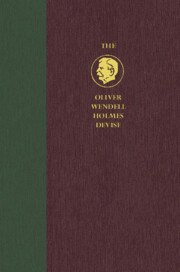Book contents
- The Hughes Court
- The Oliver Wendell Holmes Devise History of the Supreme Court of the United States
- Additional material
- Additional material
- The Hughes Court
- Copyright page
- Contents
- Acknowledgments
- Preface
- Table of Cases
- Introduction
- Part I The Opening Years
- Part II Continuities
- Section A: Administrative Law
- Section B: Civil Liberties and Civil Rights
- Chapter 23 The Uncertainties of Theory
- Chapter 24 Progressivism, Prohibition, and Organized Crime
- Chapter 25 Race, Criminal Justice, and “Labor Defense”
- Chapter 26 Race and Strategic Litigation
- Chapter 27 The Hughes Court and Radical Political Dissent
- Chapter 28 The Hughes Court and Radical Religious Dissent
- Section C: Justiciability
- Part III New Approaches Begin to Emerge
- Historiographical Essay
- Index
Chapter 28 - The Hughes Court and Radical Religious Dissent
from Section B: Civil Liberties and Civil Rights
Published online by Cambridge University Press: 13 January 2022
- The Hughes Court
- The Oliver Wendell Holmes Devise History of the Supreme Court of the United States
- Additional material
- Additional material
- The Hughes Court
- Copyright page
- Contents
- Acknowledgments
- Preface
- Table of Cases
- Introduction
- Part I The Opening Years
- Part II Continuities
- Section A: Administrative Law
- Section B: Civil Liberties and Civil Rights
- Chapter 23 The Uncertainties of Theory
- Chapter 24 Progressivism, Prohibition, and Organized Crime
- Chapter 25 Race, Criminal Justice, and “Labor Defense”
- Chapter 26 Race and Strategic Litigation
- Chapter 27 The Hughes Court and Radical Political Dissent
- Chapter 28 The Hughes Court and Radical Religious Dissent
- Section C: Justiciability
- Part III New Approaches Begin to Emerge
- Historiographical Essay
- Index
Summary
Religious believers organized a strong peace movement in the 1920s and 1930s prior to the rise of fascism in Europe. They challenged state programs requiring university students to participate in the Reserve Officers Training, and attempted to obtain citizenship in the face of a statutory requirement that cprospective citizens indicate their willingness to serve in the armed forces. In contrast to its decisions dealing with political dissent, the Hughes Court did little to accommodate this form of religious dissent.
- Type
- Chapter
- Information
- The Hughes CourtFrom Progressivism to Pluralism, 1930 to 1941, pp. 726 - 746Publisher: Cambridge University PressPrint publication year: 2022

